Hyderabad: Obsessive-compulsive disorder is a mental disorder characterised by unreasonable thoughts and fears (obsessions) that lead to compulsive behaviours. OCD often centres on themes such as a fear of germs or the need to arrange objects in a specific manner.
People suffering from OCD are more likely to struggle a lot during this COVID-19 pandemic by following too many hygienic practices every day. Nathaniel Van Kirk, coordinator of Clinical Assessment for McLean's OCD Institute, believes that the ways individuals with OCD are dealing with the pandemic depend on the nature of their condition. "For some, it may intensify their symptoms, especially if their symptoms or obsessions are in line with contamination or getting sick or fear of being responsible for harm coming to others through potentially passing the virus on to someone else," he explained.
Others, however, are experiencing no change at all. Van Kirk said that he has talked to many people with OCD who said that they didn't feel overly concerned with COVID-19. It's not one of the things they worry about, and it pales in comparison to some of the other worries that they may have.
Also read: How Coronavirus pandemic can reshape travel habits for good
In any case, the coronavirus pandemic presents significant difficulties for those whose OCD symptoms line up with current concerns. For instance, directions on how good hygiene can stop the spread of the virus may cause some to go to extremes. Although various health organisations have issued handwashing guidelines, according to Van Kirk, "someone with OCD may feel an intense urge or drive to take it much further, feeling that more must be better, especially when feelings of anxiety or uncertainty take hold."
Van Kirk explained that someone living with OCD may focus solely on one part of the hygiene guidelines and ignore the rest. "Extreme anxiety can cause you to get tunnel vision where we may not be following the recommendations the way we should be because we're so hyper-focused on a specific piece of it that you forget about the other aspects of the CDC's guidance," he said. "It's an example of how rituals develop. It's an attempt to get rid of uncertainty and the anxiety that goes with it."
The continuous flow of news and information about the pandemic can also create problems for people with OCD. "OCD takes one point of information and causes it to explode. One story or one headline can become all-consuming," Van Kirk said. "It can be hard to filter fact and relative risk from what anxiety is amplifying."
To address this dilemma, Van Kirk advises his patients to focus on trusted sources of information and follow established rules and guidelines. "In today's world, we can only focus on the things that we can control and the information that comes from solid sources like the CDC and the WHO," Van Kirk said. "But with that comes an acceptance that we can't be 100% certain that what we're doing now will guarantee 100% safety. We can only do the best we can, and that can be unnerving.
Also read: COVID-19: People with lung diseases remain at high risk
In many ways, the coronavirus crisis may increase the general public's understanding of OCD. "Anxiety tends to be higher today because it is across the board. Everyone is getting a sense of what it's like to live with obsessions and anxiety every day," said Van Kirk. "Fears such as what if I'm asymptomatic?' or 'what if I harm somebody without even knowing it?' are the kinds of concerns that someone with OCD struggles with every day."
For everyone—those with OCD and those without—Van Kirk recommends balance and perspective. "We need to keep up with the guidelines but not chase headlines and let anxiety take over," he said. "There's a level of uncertainty we have to accept to navigate our everyday life while also observing best practices."



